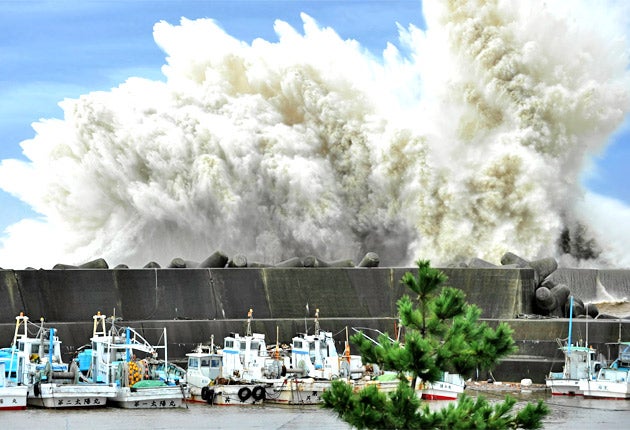Typhoon threatens Fukushima reactors

One of the most powerful storms to hit Tokyo in years brought back bitter memories of Japan's tsunami disaster in March, and threatened to further damage the Fukushima nuclear plant.
Typhoon Roke barrelled into the capital during evening rush hour last night, packing gusts of more than 124mph, cutting off public transport and stranding hundreds of thousands of people in the world's most populated metropolis. "It's just one thing after another," said Takeshi Goto, a businessman who sheltered in the world's busiest station, Shinjuku, in central Tokyo.
Roke has killed at least five people, left 89,000 homes without power, and triggered evacuation notices in more than a million homes west of the capital before moving up the coast, according to state broadcaster, NHK.
Last night the typhoon was weakening but headed straight for the tsunami-battered north-east coast, where engineers at the disabled Fukushima Daiichi nuclear complex were working frantically to prevent radioactive leaks. Weather officials say more than 200mm (7.9in) of rain could fall on Fukushima prefecture, threatening to flood already overloaded facilities at the plant, which was disabled by the earthquake and tsunami on 11 March. Workers were racing to cover the reactors with sheets against the rain last night.
"The biggest element of concern is the rise of [radioactive] water levels in turbine buildings," said Junichi Matsumoto, of the Tokyo Electric Power Co (Tepco). "We expect to be able to withstand [an overflow] even if water levels rise suddenly."
Tepco has been pumping water into the plant's three crippled reactors in an attempt to bring down the temperature of its melted nuclear fuel. The operation has left over 100 million litres of radioactive water onsite in basements and trenches. Tepco says it has been decontaminating the plant since July, but observers fear more toxic water may be leaking out.
Roke caps a summer of unusually powerful storms. Typhoon Talas dumped nearly two metres of rain and killed 67 people earlier this month, making it the deadliest to hit the country in seven years.
Join our commenting forum
Join thought-provoking conversations, follow other Independent readers and see their replies
Comments
Bookmark popover
Removed from bookmarks